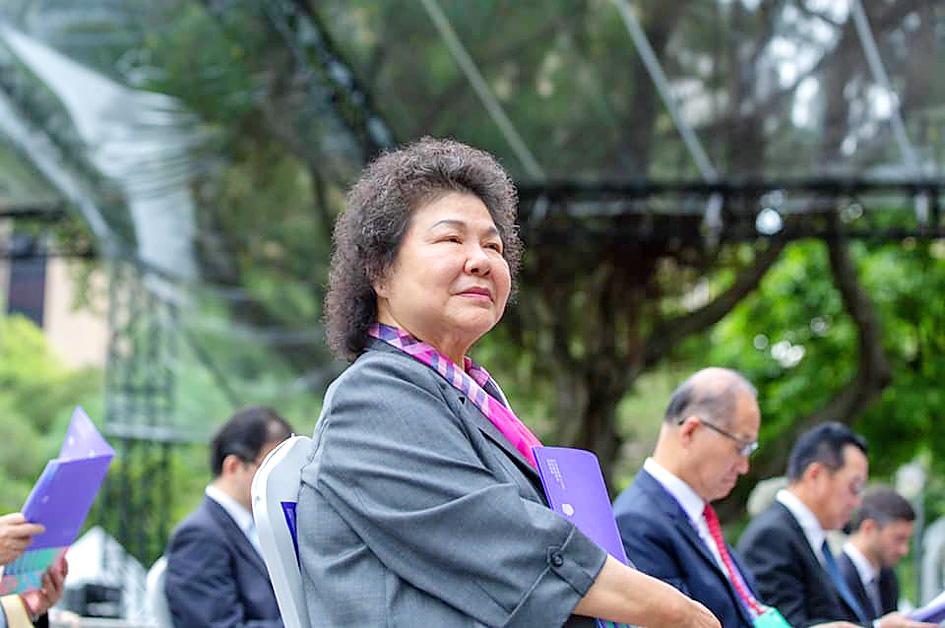Former Presidential Office secretary-general Chen Chu (陳菊) is to be appointed as Control Yuan president today, while doubling as head of the nation’s newly established National Human Rights Commission.
President Tsai Ing-wen (蔡英文) has drawn up a list of seven other people to serve on the commission, in line with the Organic Act of the Control Yuan National Human Rights Commission (監察院國家人權委員會組織法), which was passed by the Legislative Yuan in December last year and promulgated in January.
Under the act, the 10-member commission is to be headed by the Control Yuan president and composed of seven Control Yuan members, with its other two members to be selected from candidates nominated by the commission members and replaced annually.

Photo: Wang Jung-hsiang, Taipei Times
Chen, a Democratic Progressive Party member and a former Kaohsiung mayor, was imprisoned in the wake of the 1979 Kaohsiung Incident, when the then-Chinese Nationalist Party (KMT) regime arrested pro-democracy activists.
Other commission members to double as new Control Yuan members are Chi Hui-jung (紀惠容), a long-time women’s rights activist; former League for Persons with Disabilities secretary-general Wang Jung-chang (王榮璋); Youth Rights and Welfare secretary-general Yeh Ta-hua (葉大華); and Antonio Hong (鴻義章), a member of the Presidential Office’s Indigenous Historical Justice and Transitional Justice Committee, said sources familiar with the topic, who spoke on condition of anonymity.
The new Control Yuan members are to assume their duties from Aug. 1.
The other commission members are current Control Yuan members: Wang Yu-ling (王幼玲), a long-time activist for the rights of migrant workers and people with disabilities; former Judical Reform Foundation executive officer Kao Yung-cheng (高涌誠); and environmental and human rights activist Tien Chiu-chin (田秋堇), the sources said.
Tsai’s list nominated people with expertise and practical experience in various areas of human rights so that the commission would be able to competently handle a variety of rights issues, they added.
The sources said that Tsai nominated four women and three men to be on the commission, in line with the Organic Act of the Control Yuan (監察院組織法), which states that the “composition shall be diverse and include representatives from different ethnic groups or professional fields” and “no gender shall constitute less than one-third of the members.”
The Control Yuan, a body with wide-ranging government oversight powers, has 29 members, including a president and a vice president, who are nominated by the president and approved by the Legislative Yuan.

POSITIVE DEVELOPMENT: Japan and the US are expected to hold in-depth discussions on Taiwan-related issues during the meeting next month, Japanese sources said The holding of a Japan-US leaders’ meeting ahead of US President Donald Trump’s visit to China is positive news for Taiwan, former Japan-Taiwan Exchange Association representative Hiroyasu Izumi said yesterday. After the Liberal Democratic Party’s landslide victory in Japan’s House of Representatives election, Japanese Prime Minister Sanae Takaichi is scheduled to visit the US next month, where she is to meet with Trump ahead of the US president’s planned visit to China from March 31 to April 2 for a meeting with Chinese President Xi Jinping (習近平). Japan and the US are expected to hold in-depth discussions on Taiwan-related issues during the

‘LIKE-MINDED PARTNER’: Tako van Popta said it would be inappropriate to delay signing the deal with Taiwan because of China, adding he would promote the issue Canadian senators have stressed Taiwan’s importance for international trade and expressed enthusiasm for ensuring the Taiwan-Canada trade cooperation framework agreement is implemented this year. Representative to Canada Harry Tseng (曾厚仁) in an interview with the Central News Agency (CNA) said he was increasingly uneasy about Ottawa’s delays in signing the agreement, especially as Ottawa has warmed toward Beijing. There are “no negotiations left. Not only [is it] initialed, we have three versions of the text ready: English, French and Mandarin,” Tseng said. “That tells you how close we are to the final signature.” Tseng said that he hoped Canadian Prime Minister Mark Carney

Taiwan has received more than US$70 million in royalties as of the end of last year from developing the F-16V jet as countries worldwide purchase or upgrade to this popular model, government and military officials said on Saturday. Taiwan funded the development of the F-16V jet and ended up the sole investor as other countries withdrew from the program. Now the F-16V is increasingly popular and countries must pay Taiwan a percentage in royalties when they purchase new F-16V aircraft or upgrade older F-16 models. The next five years are expected to be the peak for these royalties, with Taiwan potentially earning

President William Lai (賴清德) yesterday bestowed one of Taiwan’s highest honors on Saint Vincent and the Grenadines (SVG) Ambassador Andrea Clare Bowman in recognition of her contributions to bilateral ties. “By conferring the Order of Brilliant Star with Grand Cordon on Ambassador Bowman today, I want to sincerely thank her, on behalf of the Taiwanese people, for her outstanding contribution to deepening diplomatic ties between Taiwan and SVG,” Lai said at a ceremony held at the Presidential Office in Taipei. He noted that Bowman became SVG’s first ambassador to Taiwan in 2019 and